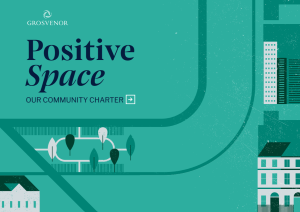 Grosvenor Britain & Ireland has launched ‘Positive Space’, a community charter setting a new standard for public engagement in the way that places are created and managed, to help shrink the space between communities and developers.
Grosvenor Britain & Ireland has launched ‘Positive Space’, a community charter setting a new standard for public engagement in the way that places are created and managed, to help shrink the space between communities and developers.
This is part of Grosvenor’s ongoing work to help rebuild public trust in the planning process and the management of neighbourhoods and to encourage better conversations between councils, communities, and property companies.
Positive Space directly responds to a ground-breaking study on trust in large-scale development and planning undertaken by Grosvenor in 2019. The poll revealed that just 2% of the public trust developers and 7% trust the local council to act in their best interests.
It also showed that people who have interacted with the planning system are more likely to think development has had a negative impact on their area. Holding developers and councils to account was identified as the best way to increase public trust.
James Raynor, Chief Executive of Grosvenor Britain & Ireland, said: “This crisis demonstrates more than ever the need for strong communities. I want this to be at the heart of our thinking. Our business is woven into the neighbourhoods where we operate and we should see the people in our communities as experts who can continually help us improve.
We all need a much more straight-forward relationship between business, tenants and communities, where the trade-offs involved in change are positively debated and more voices heard than ever before.
This new charter is also one of the first practical attempts to deliver on the Government’s ambition to give people more meaningful involvement in how their neighbourhoods are managed and evolve. The Building Better Building Beautiful Commission called for engagement to be “wide, deep and early”. That’s exactly what Grosvenor will do now.”
The charter is based on four core principles of listening, transparency, engagement and accountability.
Tested with over 20 frontline workers from community organisations, property companies and councils, it sets out Grosvenor’s commitment to communities – whether around a new development or the management of an existing neighbourhood.
- We will listen & learn – recognising residents and stakeholders are experts on their neighbourhood.
- We will open ourselves up – explaining our objectives clearly and offering genuine choices and opportunities for influence.
- Making it easier to participate – providing more opportunities to understand and shape proposals for a neighbourhood and increasing participation from drastically under-represented groups such as younger people.
- Making ourselves more accountable – reporting on clear and measurable outcomes for projects and giving communities a greater role in the governance of their neighbourhood.
Recognising that everyone needs to engage positively, Grosvenor is also making some asks of communities in return. Click here to read the charter in full.
Grosvenor Britain & Ireland has been creating and managing places for more than 350 years. Its heartland of Mayfair and Belgravia is home to c9,000 residents and c50,000 workers. The business has also recently secured permission to create a new neighbourhood with 1,500 build to rent homes in Bermondsey and has a pipeline of c20,000 homes across the south east of England.
The behaviours and commitments in Positive Space are being embedded in all Grosvenor’s live projects and ongoing asset management programmes. Examples of immediate delivery on existing projects include:
- The brief for the redesign of Grosvenor Square in central London and the engagement programme itself has been co-produced with residents and councillors;
- At our Build to Rent scheme in Bermondsey Grosvenor will track delivery of the benefits we have promised through targets being developed with the community;
- While at the South Molton Triangle next to Bond Street West Crossrail Station, the consultation includes a bespoke online youth survey.

